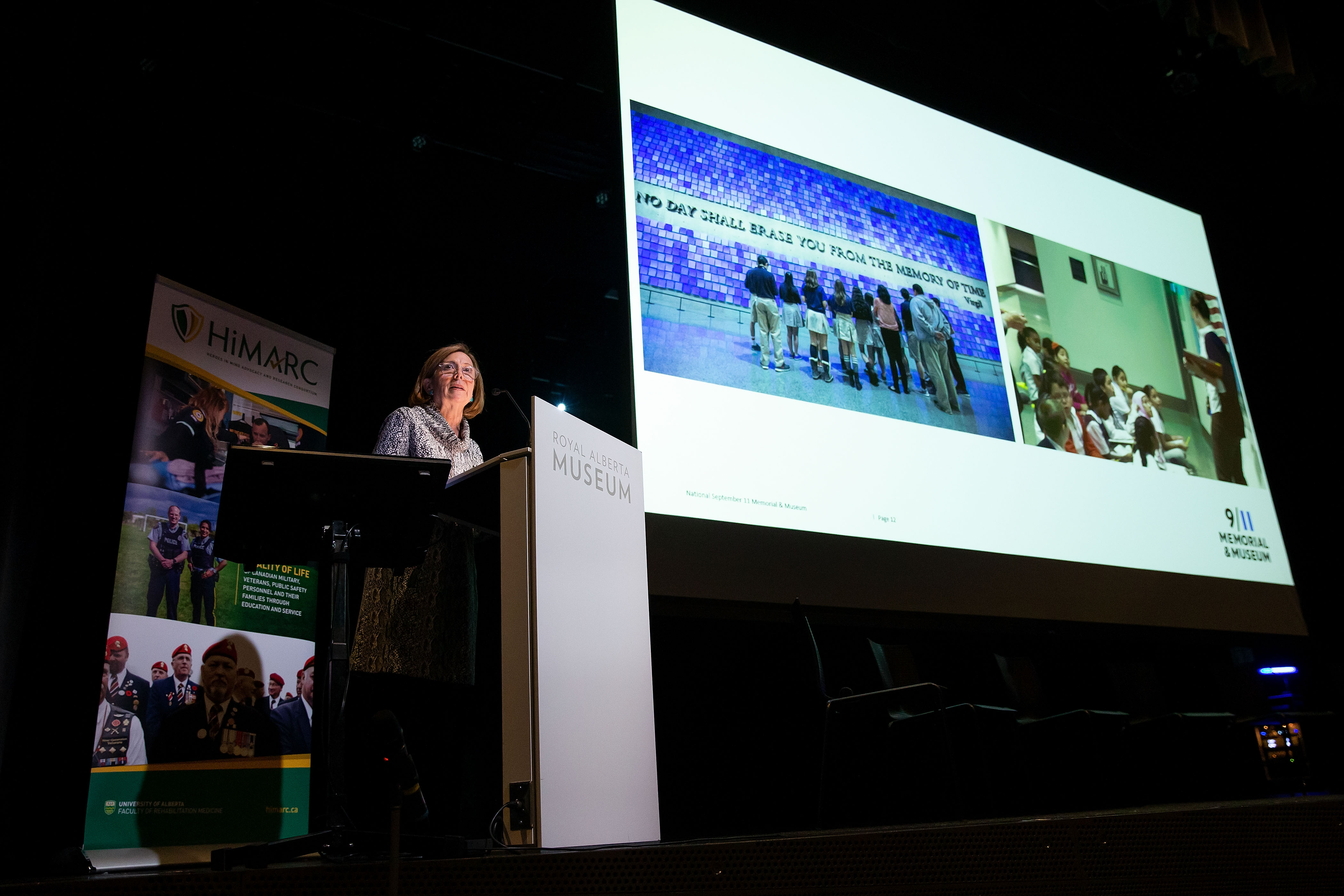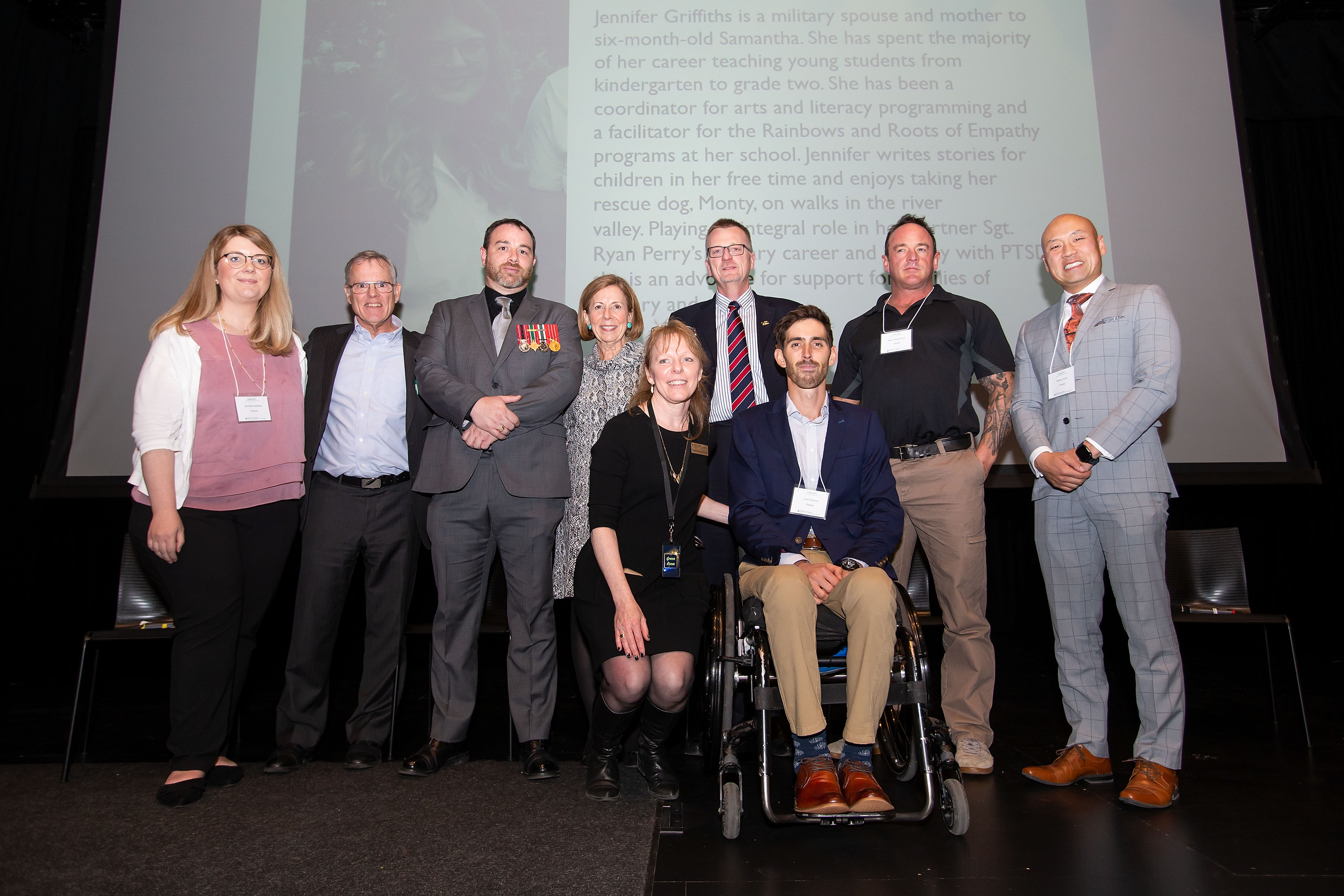
Alice M. Greenwald presented at HiMARC's event, Ground Zero: Building resilience when the unthinkable happens on October 15 at the Royal Alberta Museum. (Photo: Codie McLachlan)
When catastrophes or horrific events happen, we struggle as a society to make sense of them, don't know how to respond, or may become angry and bitter. At the same time, many stories of individual and community resilience inspire us, leaving us in awe.
On October 15, the University of Alberta, Faculty of Rehabilitation Medicine and Heroes in Mind, Advocacy and Research Consortium (HiMARC) hosted Alice M. Greenwald, president and CEO, National September 11 Memorial & Museum, New York. Greenwald has been immersed in the creation of the National September 11 Memorial & Museum since 2006. She was named president and CEO in 2017. From 2001 to 2006, Greenwald was associate museum director, museum programs at the United States Holocaust Museum in Washington D.C., having served as an expert advisor to the project for the previous 14 years.
Building on Greenwald's presentation, the Edmonton event, Ground Zero: Building resilience when the unthinkable happens, which took place from 6:00 to 8:00 p.m. on Tuesday at the Royal Alberta Museum, also featured a panel of special guests from the community: military, veterans and public safety personnel, as well as HiMARC's Director, Suzette Bremault-Phillips.
Over 150 guests filled the Amiskwaciy Theatre for inspiring presentations and talks about resiliency, hope and moving forward as a community. Afterward, participants were treated to a reception in the Theatre Lobby where more discussions about building a strong community of military, veterans, public safety personnel and their families transpired, creating a meeting point for thought leaders and change-makers alike.

Panelists and speakers. Back row, L to R:
Jennifer Griffiths, Martin Ferguson-Pell, Ryan Perry,
Alice M. Greenwald, Andrew Sharman, Mark
Stephenson and Wilson Quan. Front row:
Suzette Bremault-Phillips and Joshua Pelland.
(Photo: Codie McLachlan)
HiMARC is continuously working to improve the health and quality of life of Canadian military, veterans, public safety personnel and their families through research, education and service. With this event, the consortium was able to shed light on the hardships faced by front-line workers who risk their lives on a daily basis.
A special thank you to our presenters and panelists:
Alice M. Greenwald, president and CEO, National September 11 Memorial & Museum: As CEO, Greenwald is responsible for the overall vision, financial well-being, management and long-term sustainability and relevance of the September 11 Memorial & Museum. From 2006-2016, she oversaw the articulation and implementation of a founding vision for the September 11 Memorial & Museum, managing its programming, collecting, exhibition and educational initiatives.
Suzette Bremault-Phillips, director, HiMARC, Faculty of Rehabilitation Medicine, UAlberta: As an occupational therapist and researcher, Bremault-Phillips is a 'boundary-spanner' who bridges research and practice and facilitates inter-professional collaboration, capacity-building and knowledge translation. Her focus is in the areas of mental and spiritual health, resilience and well-being (military and civilian) and the study and implementation of evidence-informed practice.
Jennifer Griffiths, military spouse and partner of Ryan Perry: Griffiths has spent the majority of her career teaching young students from kindergarten to grade two. She has been a coordinator for arts and literacy programming and a facilitator for the Rainbows and Roots of Empathy programs at her school. Playing an integral role in her partner Sgt. Ryan Perry's military career and journey with PTSD, she is an advocate for support for families of military and veterans.
Joshua Pelland, veteran, United Kingdom: Pelland has worked within some of Britain's most elite military units around the globe. He transitioned out of the military into the private security sector as an advisor. Seeking peace and new adventures, he pursued his passion of climbing pillars of ice, rock and mountains around the world. In June 2016, he survived a fall of 65 feet that left him paralyzed from the chest down. Undeterred, he has taken all of the energy, focus and positive mindset from his life before and has used it to endure beyond the constraints of his injury.
Ryan Perry, member, Canadian Armed Forces: Sgt. Ryan Perry has been a member of the Canadian Forces for 23 years. He has completed multiple operational tours in Afghanistan and Ukraine, as well as multiple domestic operations. Perry has served in various roles in the CAF, including driver, gunner, crew commander, patrol commander, electrical engineer and advisor. He was diagnosed with PTSD in 2010. With the support of his partner Jennifer Griffiths and their six-month-old daughter Samantha, Perry has been completing 3MDR treatment using virtual reality through the CAREN system as part of the Heroes in Mind, Advocacy Research Consortium (HiMARC's) research initiative.
Wilson Quan, fromer police officer and founder, First Response to Fashion: Quan spent three years with the Calgary Police Service and another 15 years with the Edmonton Police Service. During this time, he worked intensely with hundreds of fellow officers and saw the psychological effects that first responders experience from the stress and tragedy they encounter. Driven by the desire to give first responders in Alberta access to groundbreaking PTSD rehabilitation as soon as it is available, Wilson and his wife Elisa founded First Response to Fashion in 2014.
Mark Stephenson, senior firefighter and acting captain, Fort McMurray Fire Department: Stephenson watched his own house burn down while he was on duty with his team fighting the Fort McMurray wildfire that forced more than 80,000 people to flee their homes. Though he was separated from his family for two weeks, Mark continued fighting alongside his team through the night and continued through the next three days.
Thank you to everyone who contributed to making this event a great success!